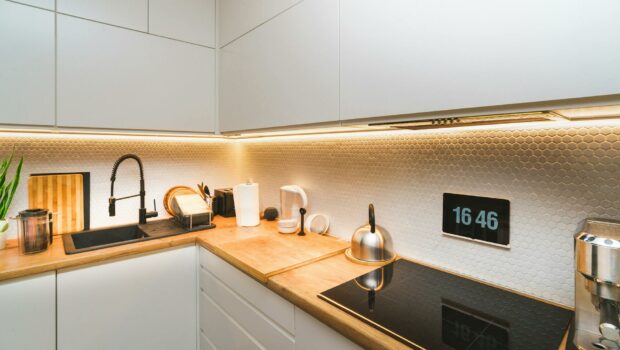The Future of Living: Everything You Need to Know About Smart Homes
In today’s technology-driven world, smart homes are transforming the way we live. What was once considered a futuristic concept is now becoming a part of everyday life. From voice-controlled assistants to AI-powered security systems, the rise of smart home technology is revolutionizing comfort, safety, and efficiency. Whether you’re planning to upgrade your home or simply exploring the latest innovations, understanding how smart homes work and what they offer is essential.
What Is a Smart Home?
A smart home is a residence where appliances, devices, and systems are connected through the internet and can be managed remotely. These devices use Wi-Fi, Bluetooth, Zigbee, or other communication protocols to interact with each other. This allows homeowners to automate daily tasks, control settings through smartphones, and optimize their living environment with minimal effort.
For example, you can turn off the lights in your bedroom using a voice command, lock your doors remotely, or schedule your thermostat to adjust automatically based on the weather.
Key Benefits of Smart Homes
1. Convenience and Comfort
One of the biggest advantages of smart homes is convenience. Instead of managing multiple switches, remotes, or manual settings, you can control everything from a central app or with simple voice commands. Imagine saying “Good night” to Alexa, and your home instantly dims the lights, locks the doors, and adjusts the temperature.
2. Energy Efficiency and Cost Savings
Smart devices like thermostats, lights, and appliances are designed to reduce energy waste. For example, a smart thermostat learns your daily routine and adjusts heating and cooling automatically, saving money on bills. Smart plugs cut power to unused electronics, while smart lights turn off when no one is in the room.
3. Enhanced Security and Safety
Smart homes are equipped with state-of-the-art security systems, including video doorbells, motion sensors, surveillance cameras, and smart locks. These allow homeowners to monitor their property in real time and receive instant alerts on suspicious activities. Some systems even integrate with law enforcement for faster response times.
Security goes beyond physical doors and windows. Since smart devices are connected online, cybersecurity is crucial. Just like you would use an IMEI Check to verify the authenticity and safety of a smartphone before buying it, ensuring your smart devices are secure and updated helps protect your home from digital threats.
4. Health and Well-Being
Modern smart homes go beyond security and convenience. Devices like smart air purifiers, water filtration systems, and even sleep-tracking gadgets help you maintain a healthier lifestyle. Smart kitchens can even suggest healthy recipes based on what’s in your fridge.
5. Increased Property Value
Real estate studies show that homes equipped with smart technology are more appealing to buyers. This applies to all property types, from traditional houses to specialty markets like tiny houses for sale Minnesota. As demand for smart living grows, properties with pre-installed smart systems often enjoy higher resale value and faster sales..
Popular Smart Home Devices
The market is full of innovative smart home products designed for different needs. Some of the most popular include:
- Smart Speakers & Voice Assistants: Amazon Alexa, Google Nest Hub, Apple HomePod.
- Smart Lighting Systems: Philips Hue, LIFX, Nanoleaf.
- Smart Thermostats: Nest Learning Thermostat, Ecobee, Honeywell Lyric.
- Smart Security Systems: Ring Doorbell, Arlo Cameras, SimpliSafe, ADT Smart Home.
- Smart Appliances: AI-powered refrigerators, washing machines, ovens, and robotic vacuum cleaners.
- Smart Entertainment Systems: Connected TVs, home theaters, and multi-room audio setups.
Challenges of Smart Homes
While the advantages are clear, smart homes are not without challenges:
- Privacy Concerns: Data collection from smart devices raises questions about how personal information is used and stored.
- Cybersecurity Risks: Hackers may attempt to access smart devices, making strong passwords and regular updates essential.
- High Initial Costs: While long-term savings exist, the upfront cost of devices can be expensive for some households.
- Compatibility Issues: Different brands may not always integrate smoothly, requiring homeowners to choose carefully.
The Future of Smart Homes
The smart home industry is rapidly evolving. The integration of Artificial Intelligence (AI) and the Internet of Things (IoT) will make homes more intuitive and predictive. Here are some trends to watch:
- AI-Powered Personalization: Homes that learn your habits and anticipate your needs, from preferred lighting to daily routines.
- Energy-Optimized Communities: Neighborhoods where all homes are connected to smart grids, optimizing collective energy use.
- Robotics Integration: Robotic assistants for cleaning, cooking, and even caregiving.
- 5G Connectivity: Faster and more reliable connections, allowing seamless operation of multiple devices simultaneously.
- Sustainability: Eco-friendly smart solutions, such as solar-powered devices and water-saving smart irrigation systems.
Are Smart Homes Worth It?
For many, the answer is yes. While there are initial costs and learning curves, the long-term benefits of savings, security, and convenience make smart homes a worthwhile investment. As technology becomes more affordable and widely adopted, smart living will soon become the standard, not the exception.
Conclusion
Smart homes are no longer a futuristic dream—they are here, reshaping how we live every day. With endless opportunities for customization, homeowners can enjoy a lifestyle that is safer, more efficient, and more comfortable. As AI and IoT continue to evolve, smart homes will become even more powerful, sustainable, and accessible.
If you want a home that adapts to your lifestyle, reduces energy costs, and keeps your family safe, embracing smart home technology is the next big step.

















Fantastic read! This article does an excellent job of breaking down what smart homes are and how they’re transforming modern living. I especially liked the part about energy efficiency and home security, two areas where technology really makes a difference. The examples of connected devices give readers a clear idea of how to start building their own smart home. Very informative and inspiring!